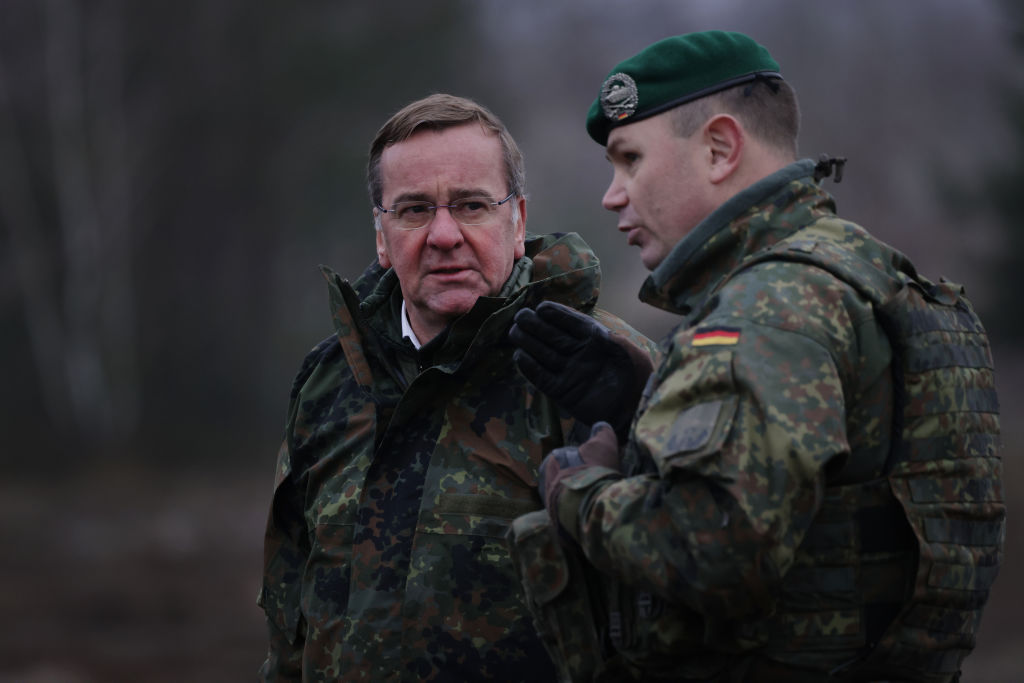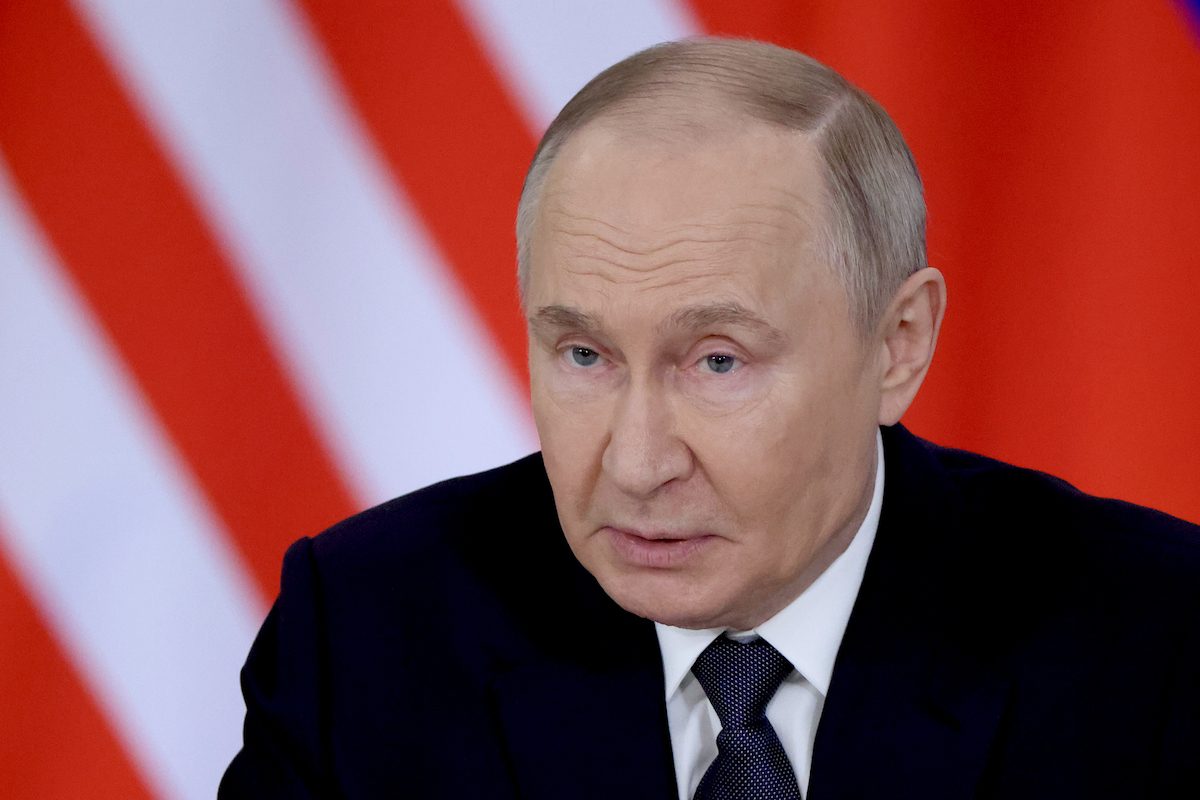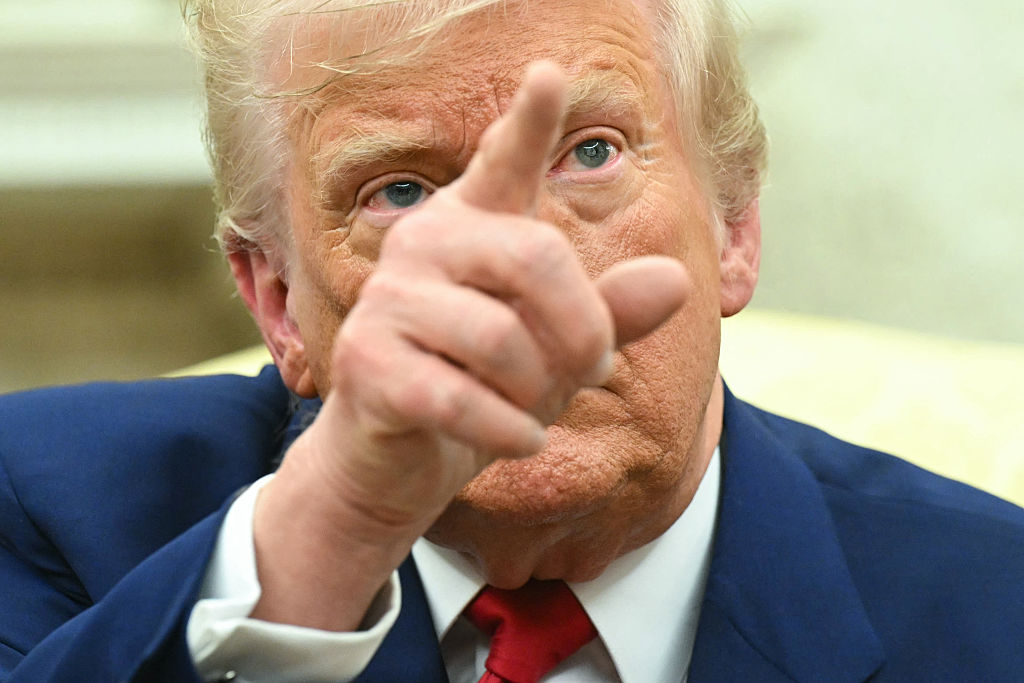An unlikely political star has risen in Germany. Boris Pistorius, a sixty-three-year-old father of two is a career politician and, as of January, defense minister, an office that has proved a dead end for many of his predecessors. On the face of it, Germany’s Boris has little by way of stardust. Yet he is the country’s most popular politician by a country mile and his department is set to increase its budget at a time when overall government spending is being sharply cut. It seems for the first time in decades, Germany is serious about security and defense — but how long will that seriousness last?
Pistorius is often seen in the media to be speaking directly with military personnel — a stark contrast to his unpopular predecessor
After exceptionally high state spending caused by the pandemic and the energy crisis, Berlin is keen to return to its usual economic prudence. Germany’s constitution contains an inbuilt debt break which limits the federal budget deficit to 0.35 percent of GDP unless there is an emergency or a recession. Returning to this rule for the 2024 draft budget has seen it slashed by just over €30 billion, nearly 7 percent, and all departments have been asked to contribute to an overall sum of €3.5 billion in government savings. All but one: the Defense Ministry.
Pistorius’s department will also be one of only four to have their budget increased next year. The second largest expense after “Labor and Social Affairs,” Defense will have €51.8 billion to play with, an increase of 3.4 percent compared to this year. Meanwhile, areas such as education (down by 5.4 percent) and social care (down by €1 billion) are being cut.
Prioritizing defense and security has not come naturally to a German government that has wanted to believe that history came to an end when the Cold War did. In 1990, the year Germany reunified, it still spent 2.5 percent of its GDP on defense. In 1992, this dropped under the 2 percent mark required by NATO and never reached that point again. Indeed, for much of Angela Merkel’s sixteen-year tenure as chancellor, military spending barely hovered above the 1 percent mark. Reports emerged that German soldiers even lacked such basic provisions as adequate underwear when serving in cold conditions.
The war in Ukraine has been a rude awakening from Germany’s dream of eternal world peace. Chancellor Olaf Scholz announced a special €100 billion fund from which the Bundeswehr, Germany’s military, should be rebuilt, and he pledged to work towards a defense budget of 2 percent of GDP by 2024. There appears to be public backing for this. When asked earlier this year whether the Bundeswehr should receive more money in addition to the special fund, even if this means cuts elsewhere or higher debt, nearly two-thirds of the respondents to a representative survey said that it should.
But years of neglect have relegated the Bundeswehr to the role of the unwanted stepchild of a state that tolerated its presence rather than embraced it as an integral part of its being. If this mindset can’t be shifted and the special fund runs out without replacement, Germany’s defense budget could drop back under the 2 percent barrier as early as 2026, according to a study by the German Economic Institute.
There are already many vocal critics of this new focus on defense. Sevim Dağdelen, a member of parliament for the far-left party Die Linke, argued that “the coalition government should concentrate on social security,” rather than “waste” increasing amounts of money on “NATO rearmament and the US military presence in Germany.”
Even many politicians in Scholz’s ruling Social Democratic Party (SPD) have their doubts. The Ministry of Economic Cooperation and Development will have its budget cut next year while Pistorius receives an extra €1.7 billion. His fellow SPD man Ralf Stegner from the left wing of the party said he “would find it wrong if the defense budget was to rise while the development budget was to fall.”
Deborah Düring, a spokesperson for the Green Party, who are part of the governing coalition, agrees: “A one-sided raising of the defense budget at the cost of economic cooperation and humanitarian aid goes against the principles of the coalition treaty” her party has with the SPD.
Others are concerned that skepticism towards a stronger military runs deep in Germany’s political class, even into the heart of the Defense Ministry itself. Nico Lange, a former chief of staff there, told the Washington Post that “there is no real reform impulse inside the ministry — they have to be pushed from the top down.”
Pushing from the top down is exactly what Boris Pistorius wants to do and what has made the plain-spoken defense minister so popular. He has not only defended his increased budget but made it clear that “we cannot stop here.” He had originally asked for an increase of €10 billion, insisting that the “Bundeswehr must continue to be modernized and properly supplied.”
Pistorius is often seen in the media to be speaking directly with military personnel — a stark contrast to his unpopular predecessor Christine Lambrecht who appeared so disinterested in her job that the German weekly Der Spiegel dubbed her the “can’t-be-bothered minister.” Pistorius, by contrast, has been instrumental in bolstering German support for Ukraine and in implementing it. He also announced that the Bundeswehr would station 4,000 more troops in Lithuania, on NATO’s eastern flank and told the New York Times that “his country is ready to assume a more assertive stance in the face of growing international instability.”
But no matter how assertive Pistorius may be or how effective his reforms, decades of neglect have become entrenched in skeptical politicians, depleted supplies, recruitment issues, difficult procurement regulations and other red tape.
If Germany’s popular defense minister can keep his nerve and continue to pursue his country’s military reforms with the pragmatism and dogged determination he has shown so far, there is a chance he might succeed. But the path to a Germany that will shoulder its fair share of Europe’s security is long and full of obstacles.
This article was originally published on The Spectator’s UK website.

























